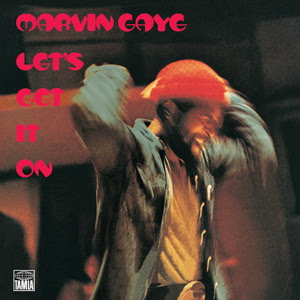I was inspired by a podcast called The 500 hosted by Los Angeles-based comedian Josh Adam Meyers. His goal, and mine, is to explore Rolling Stone Magazine's 2012 edition of The 500 Greatest Albums of All Time.
Album: #165
Album Title: Let's Get It On
How familiar was I with it before this week: A little
Song I am putting on my Spotify Playlist: Let's Get It OnIt was nearly midnight as the luxury coach pulled away from Saunders Secondary School in London, Ontario, in April, 1983. Aboard were roughly 50 student musicians and a half dozen teachers set to embark on a four-night excursion to Boston, Massachusetts, for a band competition. Eventually, the passengers would find a way to sleep during the 11-hour journey; but that certainly wasn't going to happen for the first few hours -- the excitement was palpable.
As the chartered bus motored its way along Ontario highways toward the New York State border, some students played cards while others listened to music wired from their portable devices into their headphones. One student brought along an impressive boombox and a bag full of D batteries to charge it.
To the delight of many of the passengers, he assumed the role of DJ and cued-up the latest radio hits, including tracks from Culture Club, Duran Duran, Michael Jackson and Toto. He also played a single from soul singer Marvin Gaye, the racy and provocatively titled Sexual Healing from his 17th (and final) studio record, Midnight Love.
He was born Marvin Pentz Gay Jr. in Washington, D.C., in 1939 to Pentecostal Minister Marvin Gay Sr. and domestic worker Alberta Gay. He grew up impoverished, living in public housing. He was also raised in accordance with his father's strict code of conduct. According to biographer David Ritz, Marvin Jr. was subjected to "brutal whippings" for even the smallest transgression and described his homelife as, "living with a king, a very peculiar, changeable, cruel, and all powerful king". Gay Sr. also had a troubled childhood involving domestic abuse, violence and shootings. His decision to become a minister was, in a way, an attempt to escape his own turbulent upbringing. However, as is often the case, abused children become abusers themselves.
 |
| Gaye Jr., centre, with his parents. |
Gaye was not interested in playing R&B when he began his Motown (Tamla) career. He wanted to perform jazz standards and his first record, The Soulful Moods of Marvin Gaye, was a commercial disappointment, causing him to return to the studio as a session drummer for other artists – among them The Marvelletes, The Miracles, and Jimmy Reid, earning about $5 a week ($60 adjusted for inflation).
Speaking of which, a year later in April 1984, another luxury coach pulled away from Saunders Secondary School with about the same number of student musicians and teachers. This time, the bus was heading to Washington, D.C., and I was not on board. In the intervening year I had become disenchanted with the school band and opted out of the music program in my final year. I am sure someone was playing the hits of the day on that bus, but I am equally certain a hot topic of conversation was the tragic news that had unfolded on April 1st. Marvin Gaye had been shot. The shooter was already in custody and, to the shock of everyone, it was Gaye's father Marvin Sr. who had fired the gun.
 |
| Gay Sr. at his sentencing hearing in 1984. |
The elder Gay retreated to a bedroom and returned with a Smith and Wesson .38 special revolver -- that Marvin Jr. had given him the previous Christmas. He shot his son twice – once in the shoulder, and the fatal bullet in the chest, perforating his lung, heart and liver. He was rushed to California Medical Centre and, at 1:01 p.m. Pacific Standard Time, and pronounced dead.Initially charged with murder, Gay Sr. was eventually convicted of the lesser crime of voluntary manslaughter after it was revealed that he had a brain tumour that, according to his defense team, likely contributed to his decision-making. However, it seems more likely that the cycle of violence that marred both their lives precipitated the tragedy. As the Greek tragedian Euripides stated 1,500 years earlier; "The gods visit the sins of the fathers upon the children".
Marvin Jr, if alive today, would also be in his mid-eighties, and the world would have likely enjoyed 40 additional years of intelligent, soulful and beautiful music.









No comments:
Post a Comment